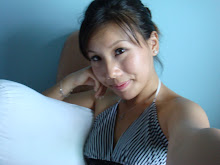.jpg) Wore it when my mum was out!such a pretty kebaya!=)
Wore it when my mum was out!such a pretty kebaya!=)Came arcoss Felicia's Chin blog who is my local favourite actress and to my surprise,she's gonna film in a drama of the life of the peranakans.Which actually aroused my interest because i have never expect mediacorp to use the peranakan as a theme for their drama.Im really happy about it because it can explain my roots (which many people dont understand and unaware of)in a storyline with so many beautiful casts,especially Felicia chin!!!I really cant wait to watch it.=D
Although im not a pure bebe but im really proud of my heritage and would really love to know more about it if possible.From my paternal side,i knew that we have difference addresses to our elderly which i really had difficulty remembering and pronoucing it when i was young.
Whenever it was chinese new year,i would get really frantic and go round asking my parents:"daddy,pek pek's wife,i must call what ar?forget already.why so hard to remember?"haha,so funny.
Example:
Ee Cik = youngest aunty (mom side)
Tua Ee = oldest aunty (mom side)
Ji EE / Ee Neo / Ee etc = other aunty (mom side)
Engku = Uncle (mom side)
En Teo = aunty's husband (mom's brother in law)
Engkim = Uncle's wife (mom's sister in law)
Eng Cek = Uncle (father's side)
Mak Eemm = Uncle's wife (father's sister in law)
Ko ko = Aunty (father's side)
Ko Poh = Grandmother's sister
Ee Poh = Parent's aunty
Ma Ma = Grandmother
Ah Khong = Grandfather
Hia hia = Brother
Che che = Sister
Some sounds really funny but i guess other dialect such as cantonese sounds really funny too.now then i realise aunty in cantonese is "kar mo". hehe i wanted to laugh when dear calls his aunty that.=p
Peranakans speak in a very weird accent too,a bit malay abit hokkien.
And i remember i used to be so mad at my mum's sister for mocking at my heritage.Whenever i speak chinese,she would always went like :"eh jojo,hahaha,you know how to speak chinese meh?your father ba ba lang, you know meh?"Then she kept giggling all the way.I was so offended that i always went home to complain to my dad and he would get fuming mad too.After her incessant mocks,i was actually so determined to show her that i knew mandarin that i went round speaking in chinese to my relatives.LOL.
And i remember i used to be so mad at my mum's sister for mocking at my heritage.Whenever i speak chinese,she would always went like :"eh jojo,hahaha,you know how to speak chinese meh?your father ba ba lang, you know meh?"Then she kept giggling all the way.I was so offended that i always went home to complain to my dad and he would get fuming mad too.After her incessant mocks,i was actually so determined to show her that i knew mandarin that i went round speaking in chinese to my relatives.LOL.
I am aware that it has a newly open peranakan mueseum and im so wanna visit it!hehe.
some knowledge (taken from the blog)Peranakan, Baba-Nyonya (峇峇娘惹; Hokkien: Bā-bā Niûⁿ-liá) and Straits Chinese (土生華人; named after the Straits Settlements) are terms used for the descendants of the very early Chinese immigrants to the Nusantara region, including both the British Straits Settlements of Malaya and the Dutch-controlled island of Java among other places, who have partially adopted Malay customs in an effort (chronological adaptation) to be assimilated into the local communities.
The word Peranakan is also used to describe Chinese Indonesians. In both Malay and Indonesian, 'Peranakan' means 'descendants'. Babas refer to the male descendants and the Nyonyas the female. The word nyonya (also commonly spelled nonya) may originate from the Portuguese word dona, which means 'lady'.
Most Peranakan are of Hoklo (Hokkien) ancestry, although a sizable number are of Teochew or Cantonese descent. Originally, the Peranakan were part Chinese, part Malay, and part descended from the (non-Malay) original inhabitants of Singapore Island.
Written records from the 19th and early 20th centuries show that Peranakan men usually took brides from within the local Peranakan community. Peranakan families also frequently imported brides from China and sent their daughters to China to find husbands. Analogous but smaller communities also exist in the region with different ethnic origins, such as the Indian Peranakans (known as the Chitty) and the Eurasian Peranakans (Kristang).
The language of the Peranakans, Baba Malay (Bahasa Melayu Baba) , is a dialect of the Malay language (Bahasa Melayu), which contains many Hokkien words. It is a dying language, and its contemporary use is mainly limited to members of the older generation; this is indicative also of the Peranakan culture at large. To reflect this unique language culture, this 'Nyonya' drama will hopefully feature the language in its originality.



No comments:
Post a Comment